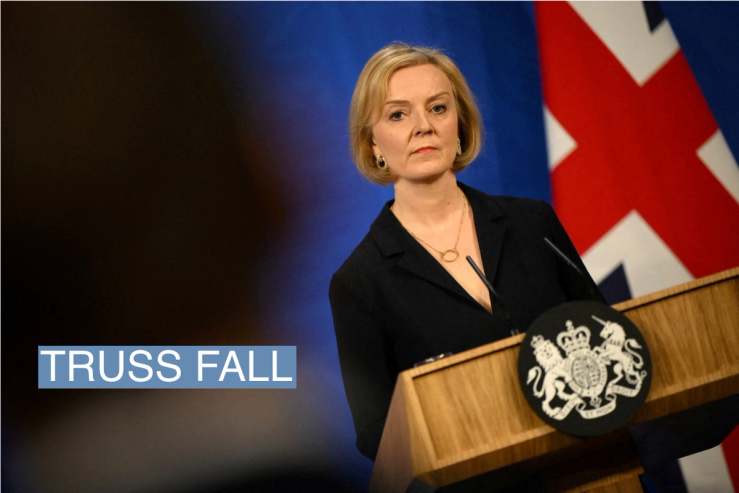The News
Liz Truss resigned as prime minister of the U.K. on Thursday after a brief but tumultuous period in office.
“I recognize that given the situation I cannot deliver the mandate on which I was elected by the Conservative Party,” Truss said in a statement outside 10 Downing Street. “I have therefore spoken to his majesty the king to notify him that I am resigning as leader of the Conservative Party.”
She said she will remain prime minister until her successor is chosen. Senior Tory officials have said a new leadership election will take place by Oct. 28.

In this article:
Know More
Truss’s 45-day tenure was marked by economic turmoil and a political crisis, forged by her disastrous fiscal plan to grow the economy by announcing unfunded tax cuts for the wealthy.
Labour Party Leader Keir Starmer reiterated his calls for a general election in the U.K. following Truss’s resignation. “The Conservative Party has shown it no longer has a mandate to govern,” he wrote in a statement on Twitter. “After 12 years of Tory failure, the British people deserve so much better than this revolving door of chaos.”
Following news of the prime minister’s departure, the pound surged 1% against the U.S. dollar.
With just six weeks at 10 Downing Street, Truss served the shortest time in office for any British prime minister. That title previously belonged to George Canning, who served for 119 days in 1827 before dying in office.

On Sept. 8, two days after Truss was appointed prime minister, the Queen died, prompting a period of mourning for the nation. A few weeks later, Truss and her finance minister, Kwasi Kwarteng, announced sweeping tax cuts aimed at improving economic growth. Their “mini-budget” caused the pound to plummet to a multi-decade low against the U.S. dollar and forced the Bank of England to intervene to stem a market crisis. The move was widely criticized by the opposition, members of her own party, as well as the public, with opinion polls showing a huge lead for the Labour Party.
Truss defended the economic program, but soon reversed her tax cut plan for Britain’s highest earners, fired Kwarteng, and then made a second U-turn on her plan to stop the planned rise of the corporate tax rate. Soon, several Conservative members of parliament publicly called for her resignation. On Oct. 17, Truss apologized for “going too far too fast” but said she was committed to the job.
In October, an article in The Economist went viral after arguing that Truss had roughly “the shelf-life of a lettuce,” given that she was in control for only seven working days — discounting the period of mourning following the Queen’s death — before she “blew up her own government.” On the morning of Kwarteng’s resignation, tabloid outlet the Daily Star ran a live feed on YouTube titled “Can Liz Truss outlast a lettuce?” which featured the doomed prime minister’s portrait next to a head of iceberg lettuce.
The View From the U.S.
U.S. President Joe Biden reaffirmed his country’s close ties to Britain in the wake of Truss’s departure.
In a statement, Biden said he thanked the prime minister for “partnership on a range of issues including holding Russia accountable for its war against Ukraine.” He added that the U.S. “will continue our close cooperation with the [U.K] government as we work together to meet the global challenges our nations face.”

